初中英语时态总结一览表
- 格式:docx
- 大小:10.16 KB
- 文档页数:2
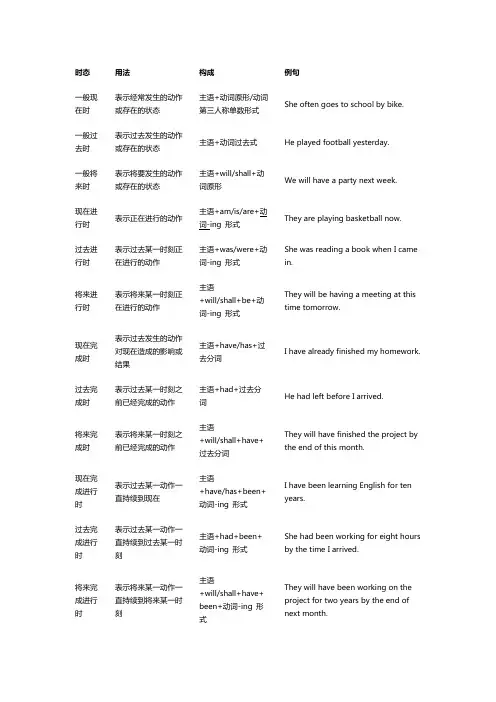
一般现在时表示经常发生的动作或存在的状态主语+动词原形/动词第三人称单数形式She often goes to school by bike.一般过去时表示过去发生的动作或存在的状态主语+动词过去式He played football yesterday.一般将来时表示将要发生的动作或存在的状态主语+will/shall+动词原形We will have a party next week.现在进行时表示正在进行的动作主语+am/is/are+动词-ing 形式They are playing basketball now.过去进行时表示过去某一时刻正在进行的动作主语+was/were+动词-ing 形式She was reading a book when I camein.将来进行时表示将来某一时刻正在进行的动作主语+will/shall+be+动词-ing 形式They will be having a meeting at thistime tomorrow.现在完成时表示过去发生的动作对现在造成的影响或结果主语+have/has+过去分词I have already finished my homework.过去完成时表示过去某一时刻之前已经完成的动作主语+had+过去分词He had left before I arrived.将来完成时表示将来某一时刻之前已经完成的动作主语+will/shall+have+过去分词They will have finished the project bythe end of this month.现在完成进行时表示过去某一动作一直持续到现在主语+have/has+been+动词-ing 形式I have been learning English for tenyears.过去完成进行时表示过去某一动作一直持续到过去某一时刻主语+had+been+动词-ing 形式She had been working for eight hoursby the time I arrived.将来完成进行时表示将来某一动作一直持续到将来某一时刻主语+will/shall+have+been+动词-ing 形式They will have been working on theproject for two years by the end ofnext month.过去将来时表示过去某一时刻之后将要发生的动作主语+would/should+动词原形He said he would come back the nextday.过去将来进行时表示过去某一时刻之后将要进行的动作主语+would/should+be+动词-ing 形式She said she would be working on theproject at that time.过去将来完成时表示过去某一时刻之后将要完成的动作主语+would/should+have+过去分词He said he would have finished thework by the end of the week.。
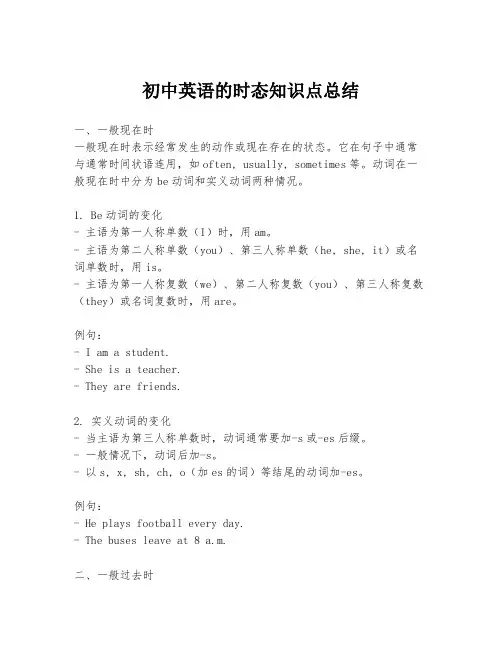
初中英语的时态知识点总结一、一般现在时一般现在时表示经常发生的动作或现在存在的状态。
它在句子中通常与通常时间状语连用,如often, usually, sometimes等。
动词在一般现在时中分为be动词和实义动词两种情况。
1. Be动词的变化- 主语为第一人称单数(I)时,用am。
- 主语为第二人称单数(you)、第三人称单数(he, she, it)或名词单数时,用is。
- 主语为第一人称复数(we)、第二人称复数(you)、第三人称复数(they)或名词复数时,用are。
例句:- I am a student.- She is a teacher.- They are friends.2. 实义动词的变化- 当主语为第三人称单数时,动词通常要加-s或-es后缀。
- 一般情况下,动词后加-s。
- 以s, x, sh, ch, o(加es的词)等结尾的动词加-es。
例句:- He plays football every day.- The buses leave at 8 a.m.二、一般过去时一般过去时表示过去某一确定时间发生的动作或存在的状态。
动词在一般过去时中要变为过去式,一般在词尾加-ed。
1. 规则变化- 动词词尾加-ed(如:played, visited)。
- 以e结尾的动词加-d(如:lived, danced)。
- 以辅音字母+y结尾的动词,变y为i再加-ed(如:studied, copied)。
2. 不规则变化不规则动词的过去式变化没有固定规则,需要特别记忆。
例如:- go去了went。
- eat吃了ate。
- begin开始began。
三、一般将来时一般将来时表示将来某一时间会发生的动作或状态。
它的构成主要有以下几种方式。
1. 将will或shall加在动词原形之前。
- I will go to school tomorrow.- He shall finish the work.2. 用“be going to + 动词原形”表示计划或打算做的事情。
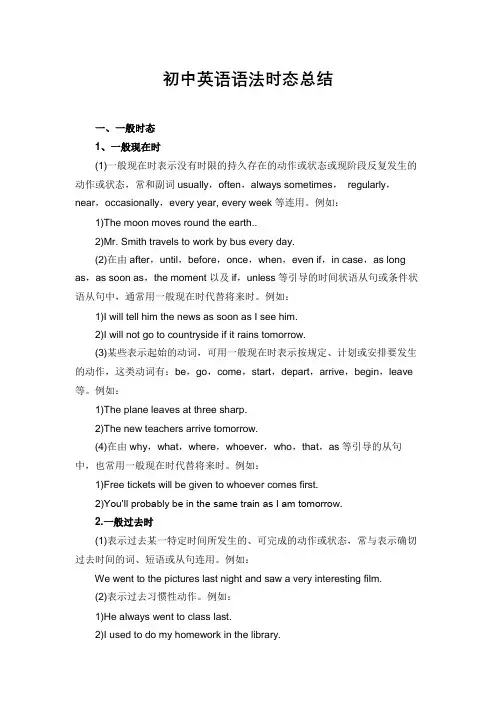
初中英语语法时态总结一、一般时态1、一般现在时(1)一般现在时表示没有时限的持久存在的动作或状态或现阶段反复发生的动作或状态,常和副词usually,often,always sometimes,regularly,near,occasionally,every year, every week等连用。
例如:1)The moon moves round the earth..2)Mr. Smith travels to work by bus every day.(2)在由after,until,before,once,when,even if,in case,as long as,as soon as,the moment以及if,unless等引导的时间状语从句或条件状语从句中,通常用一般现在时代替将来时。
例如:1)I will tell him the news as soon as I see him.2)I will not go to countryside if it rains tomorrow.(3)某些表示起始的动词,可用一般现在时表示按规定、计划或安排要发生的动作,这类动词有:be,go,come,start,depart,arrive,begin,leave 等。
例如:1)The plane leaves at three sharp.2)The new teachers arrive tomorrow.(4)在由why,what,where,whoever,who,that,as等引导的从句中,也常用一般现在时代替将来时。
例如:1)Free tickets will be given to whoever comes first.2)You’ll probably be in the same train as I am tomorrow.2.一般过去时(1)表示过去某一特定时间所发生的、可完成的动作或状态,常与表示确切过去时间的词、短语或从句连用。

初一英语时态总结一、一般现在时态(Simple Present Tense)1. 表示经常性或习惯性的动作、状态或真理。
例句:I often go to school by bus.(我经常坐公交车去学校。
) Water boils at 100 degrees Celsius.(水在100摄氏度时沸腾。
)2. 表示客观事实、科学真理或普遍规律。
例句:The sun rises in the east.(太阳从东方升起。
)Water freezes at 0 degrees Celsius.(水在0摄氏度时结冰。
) 3. 表示主语的特性或个人喜好。
例句:She likes playing basketball.(她喜欢打篮球。
)He is a smart boy.(他是个聪明的男孩。
)二、一般过去时态(Simple Past Tense)1. 表示过去某个时间发生的动作或状态。
例句:I went to the park yesterday.(我昨天去了公园。
) They lived in China when they were young.(他们年轻时住在中国。
)2. 表示过去的习惯或经常性动作。
例句:We used to play soccer every weekend.(我们过去每个周末都踢足球。
)She always studied until late at night.(她过去总是学习到很晚。
)3. 表示过去的真理或规律。
例句:Dinosaurs existed millions of years ago.(恐龙存在于几百万年前。
)The Earth was flat according to ancient beliefs.(根据古代的信仰,地球是平的。
)三、一般将来时态(Simple Future Tense)1. 表示将来某个时间或在某个时间之后发生的动作或状态。
例句:I will visit my grandparents next week.(下周我会去看望我的祖父母。


初中英语语法总结一览表语法项目构成用法一般现在时主语 +动词原形或者表示经常性的第三人称单数 -s / es 动作或状态一般过去时主语 +动词过去式表过去某个、段时间内动( did 或者 be—was/ were 作及状态主语 +be going to +动词原在将来某个时间或一般将来时形某段时要做的事will / shall + 动词原形象征词Every ?often ?always on 天季、节、年。
Ago / just now / In 1998week / yesterday 等tomorrow / afternext / tonight ?in 2010例句in 月、He goes to school every day.I often have lunch at home./last He wrote a letter yesterday.I was born in 1979.Are you going to read?He will come tomorrow.现在进行时主语 +be(am/is/are) + doing 表此时此刻正进行的动作或状态现在完成时主语 +have / has + 动词过去发生在过去影响在现在的分词现在完成进行时动作或状态等主语 +have/has been+ doing.过去进行时主语 +was / were +doing 表在过去某时间正在进行多用于复合句中的动作过去完成时主语 +had+动过去分词该动作发生在过去的过去多用于复合句中过去将来时主语 +would + 动词原形过去看来将要发生的动作多用宾语从句中或状态listen?look?nowTom is writing now.all the time?Don ’ tThey are lying on the bed.含糊的频率副词 ?already?just?never everHe has slept for two days.I have been teaching for 8 years.at this time yesterdayHe was reading at that timelast Sunday eveninglast Fridayby the time +过去时We had learnt 2000 wordswhen?after?before by the end of?last year.He said that heHe said that he would come here the nextthe next day .day .。
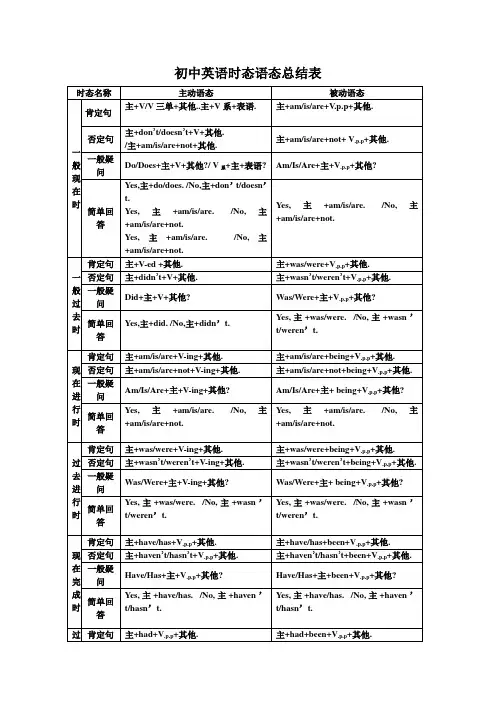
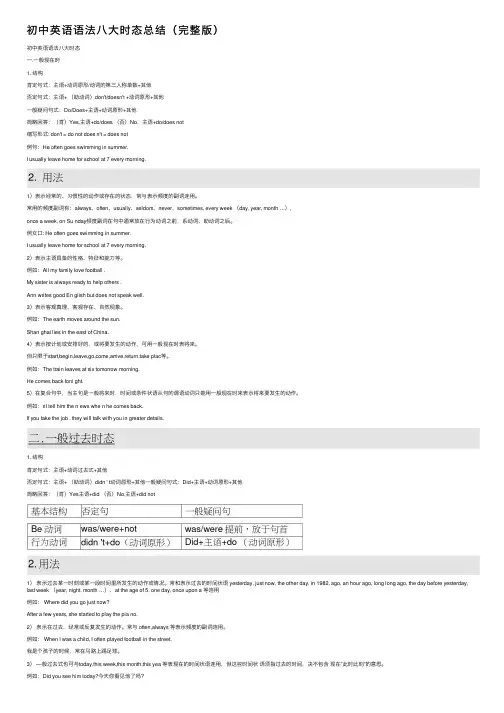
初中英语语法⼋⼤时态总结(完整版)初中英语语法⼋⼤时态⼀.⼀般现在时1. 结构肯定句式:主语+动词原形/动词的第三⼈称单数+其他否定句式:主语+ (助动词)don't/doesn't +动词原形+其他⼀般疑问句式:Do/Does+主语+动词原形+其他简略回答:(肯)Yes,主语+do/does (否)No,主语+do/does not缩写形式: don't = do not does n't = does not例句:He often goes swimming in summer.I usually leave home for school at 7 every morning.1)表⽰经常的、习惯性的动作或存在的状态,常与表⽰频度的副词连⽤。
常⽤的频度副词有:always、often、usually、seldom、never、sometimes, every week (day, year, month …),once a week, on Su nday频度副词在句中通常放在⾏为动词之前,系动词、助动词之后。
例⼥⼝: He often goes swimming in summer.I usually leave home for school at 7 every morning.2)表⽰主语具备的性格、特征和能⼒等。
例如:All my family love football .My sister is always ready to help others .Ann writes good En glish but does not speak well.3)表⽰客观真理、客观存在、⾃然现象。
例如:The earth moves around the sun.Shan ghai lies in the east of China.4)表⽰按计划或安排好的,或将要发⽣的动作,可⽤⼀般现在时表将来。
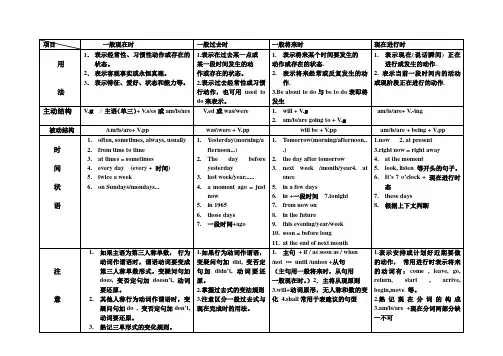
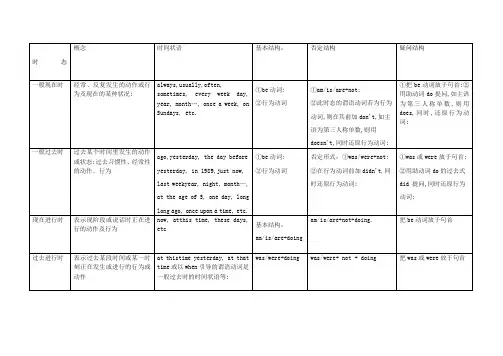
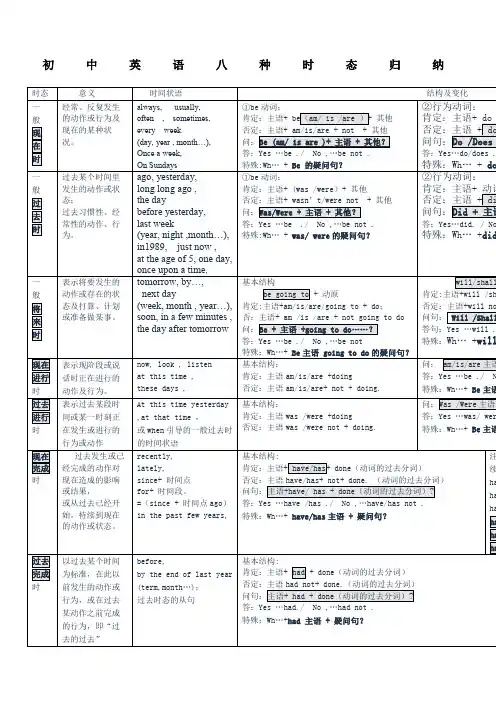
初中英语基本时态总结Ⅰ、一般现在时1、概念:1)表示经常性或习惯性的动作,常与表示频度的时间状语连用。
时间状语:always, usually, often, sometimes, seldom, never, every day, twice a week, on Sunday, etc.(提问用How often)例:I leave home for school at 7 every morning.Tom gets up at 6:00 every morning.2)客观真理,客观存在,科学事实。
例:The earth moves around the sun. 地球绕太阳转动。
Shanghai lies in the east of China. 上海位于中国东部。
3)格言或警句。
例:Pride goes before a fall. 骄者必败。
注意:宾语从句中,即使主句是过去时,从句谓语是客观真理也要用一般现在时。
例:Columbus proved that the earth is round. 哥伦布证实了地球是圆的。
2、结构:表状态S+ am/is/are+ P (句中有实义动词不用be)表动作S+V原+O (若主语是单三人称,谓动加s/es。
)3、句式变化:变疑问,有be把be提到主语前;无be在主语前加do/does,谓动变为原形。
变否定,有be在be后加“not”;无be在主语后加don’t/doesn’t,谓动变为原形。
例:①They are in the classroom. →Are they in the classroom? Yes, they are./No, they aren’t. →They aren’t in the classroom②He often waters the flowers . → Does he often water the flowers?Yes, he does. / No, he doesn’t. →He doesn’t often water the flowersⅡ、一般过去时1、概念:1)表示在确定的过去时间里所发生的动作或存在的状态。
初中英语所有时态1.一般现在时(do/does; is/am/are)①表示现在的情况、状态或特征。
例:He is a student.他是一个学生。
②表示经常性、习惯性动作。
例:He always helps others.他总是帮助别人。
③客观事实和普遍真理。
例:The earth moves the sun.地球绕着太阳转。
④表示一个按规定、计划或安排要发生的动作。
仅限于某些表示“来、去、动、停、开始、结束、继续”等的动词,可以与表示未来时间的状语搭配使用。
常见的用法是:飞机、火车、轮船、汽车等定期定点运行的交通方式。
例:The next train leaves at 3 o'clock this afternoon.下一趟火车今天下午3点开车。
⑤在时间、条件和让步状语从句中经常用一般现在(有时也用现在完成时)表示将的来事情。
(即:主将从现原则)例:I will call you as soon as I arrive at the airport.我一到机场就会给你打电话。
When you have finished the report, I will have waited for about 3 hours.等你完成这份报告的时候,我就已经等了将近3个小时了。
2. 现在进行时(am/is/are doing)①表示此时此刻正在发生的事情。
例:He is listning to the music now.他现在正在听音乐。
②表示目前一段时间内一直在做的事情,但不一定此时此刻正在做。
例:I am studying computer this term.这个学期我一直在学习计算机。
③现在进行时可以表示将来的含义。
瞬时动词的进行一定表将来。
例:I am leaving.我要离开了。
持续动词的进行只有有将来的时间状语或有将来语境中才表将来。
例:I am travelling next month.下个月我要去旅行。
初中英语时态一览表以下是初中英语主要时态的一览表:1. 现在一般时:I eat an apple every day.2. 过去一般时:She studied English last year.3. 现在进行时:They are playing basketball now.4. 过去进行时:They were having dinner at this time yesterday.5. 现在完成时:I have finished my homework.6. 过去完成时:They had learned 2000 English words by the end of last year.7. 现在完成进行时:We have been waiting for you for half an hour.8. 过去完成进行时:We had been learning English for 3 years by the end of last year.9. 将来一般时:She will visit her grandparents next week.10. 将来进行时:They will be having a meeting tomorrow.11. 将来完成时:They will have finished their work by the end of this week.12. 过去将来一般时:He said he would go to the library the next day.13. 过去将来进行时:He said he would be working on his project over the weekend.14. 过去将来完成时:He said he would have written the report by the end of the month.希望这个一览表能帮到你!如果你还有其他问题,请随时提问。
Eg:1.if i were you ,i would wear a skirt2.what would you do if you had a million dollars ?3.If i had come a few minutes earlier , you would have met him.1、S(主)+ Vi(不及物动词)(谓语)——→主动结构例如:Time flies.1)S + V + 副词(状语)例如:Birds sing beautifully.2)S + Vi + 介词短语(状语)例如:He went on holiday.3)S + Vi + 不定式(状语)例如:We stopped to have a rest.4)S + Vi + 分词(状语)例如:I'll go swimming.2、S (主)+ Vt (及物动词)(谓语)+ O(宾语)——→主动宾结构例如:We like English.3、1)S + Vt + 名词/代词例如:I like music.2)S + Vt + 不定式例如:I want to help him.[说明] 常用于这句型的动词有:decide, hope, learn, need, promise, want, 等。
3)S + Vt + 疑问词+ 不定式例如:I don't know what to do.[说明] 常用于这句型的动词有:ask, decide, find out, forget, know等。
4)S + Vt + 动名词例如:I enjoy living here.[说明] 常用于这句型的动词有:advise, enjoy, finish, mind, practise等。
5)S + Vt + 宾语从句例如:I don't think (that) he is right.[说明] 常用于这句型的动词有:hope, know, notice, think, wonder等。